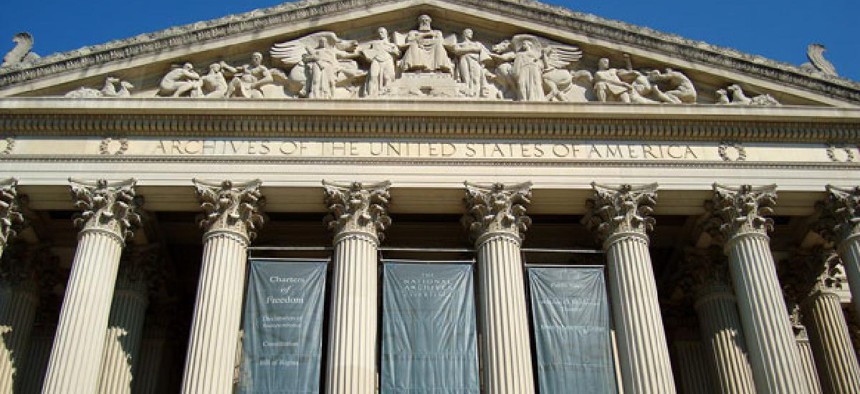
Flickr user Islespunkfan
White House summit cranks up push to better inform the public
Consumer advocates and agencies meet to simplify government data.
An all-day summit on a White House consumer awareness effort held on Friday in the National Archives and Records Administration auditorium is being called a success by the agency, academic and nonprofit sector representatives who attended the closed-to-the-press meeting.
Cass Sunstein, the Obama administration’s chief of Information and Regulatory Affairs, described the event in a blog on Friday as an opportunity for “leading innovators and experts inside and outside of government” to share best practices and practical advice on how to use Smart Disclosure -- “a new tool that helps provide consumers with greater access to the information they need to make informed choices.”
Highlighted by President Obama when he announced his September 2011 Open Government Partnership Action Plan, Smart Disclosure is a growing private and public-sector discipline that could help agencies better serve consumers by offering access to big data sets from the Environmental Protection Agency, Food and Drug Administration and other agencies, and simplifying documents such as nutrition facts and automobile fuel economy labels, and health insurance benefits statements.
Sunstein sent all agency heads a memorandum in September 2011 giving policy guidance on Smart Disclosure. It defined the term as “the timely release of complex information and data in standardized, machine-readable formats in ways that enable consumers to make informed decisions.” Developers have complained that government data sets are frequently lower quality than their commercial counterparts. Figures, for instance, often will include typos or the data will be presented in PDFs and other document formats that make the information difficult to manipulate.
In addition to posting data sets, the guidance said, “Agencies are encouraged to collaborate with other agencies and the public to ensure the usefulness of the data sets and to increase awareness of their availability. Posting such data sets can also facilitate regulatory goals, often at low cost, by fostering transparency and promoting accountability.”
An interagency task force run by the White House National Science and Technology Council is coordinating implementation, including the Friday summit, which was hosted by the White House and the Archives with support from ideas42, a New York City-based nonprofit founded by academics seeking to apply behavioral economics to business and government.
Speakers at the filled-to-capacity event attended by 300 included Sunstein; Mark Zuckerman, deputy director of the White House Domestic Policy Council; Richard Thaler, professor of economics and behavioral science at the University of Chicago business school; Chris Meyer, vice president for external affairs at Consumers Union; and Tim O'Reilly, founder and chief executive officer of O'Reilly Media Inc.
The 70 agencies and offices represented included the Consumer Financial Protection Bureau, the Treasury Department and the Federal Communications Commission. Following the speeches, agency representatives were asked to informally pitch a Smart Disclosure idea and then discuss it in breakout groups.
“The tremendous response to this summit, and the participation of such prominent speakers and panelists, shows that Smart Disclosure is coming of age,” Joel Gurin, senior consumer adviser at the FCC and chair of Task Force on Smart Disclosure, told Government Executive. “It's being recognized as an approach that can help consumers, increase transparency and ultimately make consumer markets more efficient."
Thaler, who told the crowd of his own nightmarish experience dealing with Medicare Part D online information on behalf of a friend’s elderly mother, said on Monday that “the conference was a great success and illustrates a major White House initiative that has not really been noticed by the press.” He called the effort “great for consumers and new businesses.”
Will Tucker, a senior associate at ideas42.org, said, “The goal is to educate and build the policy tools of smart disclosure as well as build momentum for getting some new initiatives in place, and both happened.”
An Archives spokeswoman said the event is aligned with her agency’s mission. “We’re substantively very interested in these issues, and particularly in proactive disclosure of government information, including huge data sets that can be used by vendors, researchers and individuals,” said Miriam Nisbet, director of the Office of Government Information Services, which is the Freedom of Information Act ombudsman for the executive branch. “Archives is also concerned about managing contemporary government records, so we help agencies manage their data and decide what has to be preserved. We’re looking at how things can be improved govermentwide.”
One writer, Alex Howard of the O’Reilly Radar online newsletter, observed the proceedings and described the session online. He said his boss offered 10 key lessons. “The future of smart disclosure includes more than quarterly data disclosure from the [Securities and Exchange Commission] or banks,” Howard wrote. “If you're really lining up with the future, you have to think about real-time data and real-time data systems.”
This article has been updated to clarify Alex Howard's description of the proceedings and to add a link to his report.
NEXT STORY: Romney's staff plays April Fool's prank on boss







